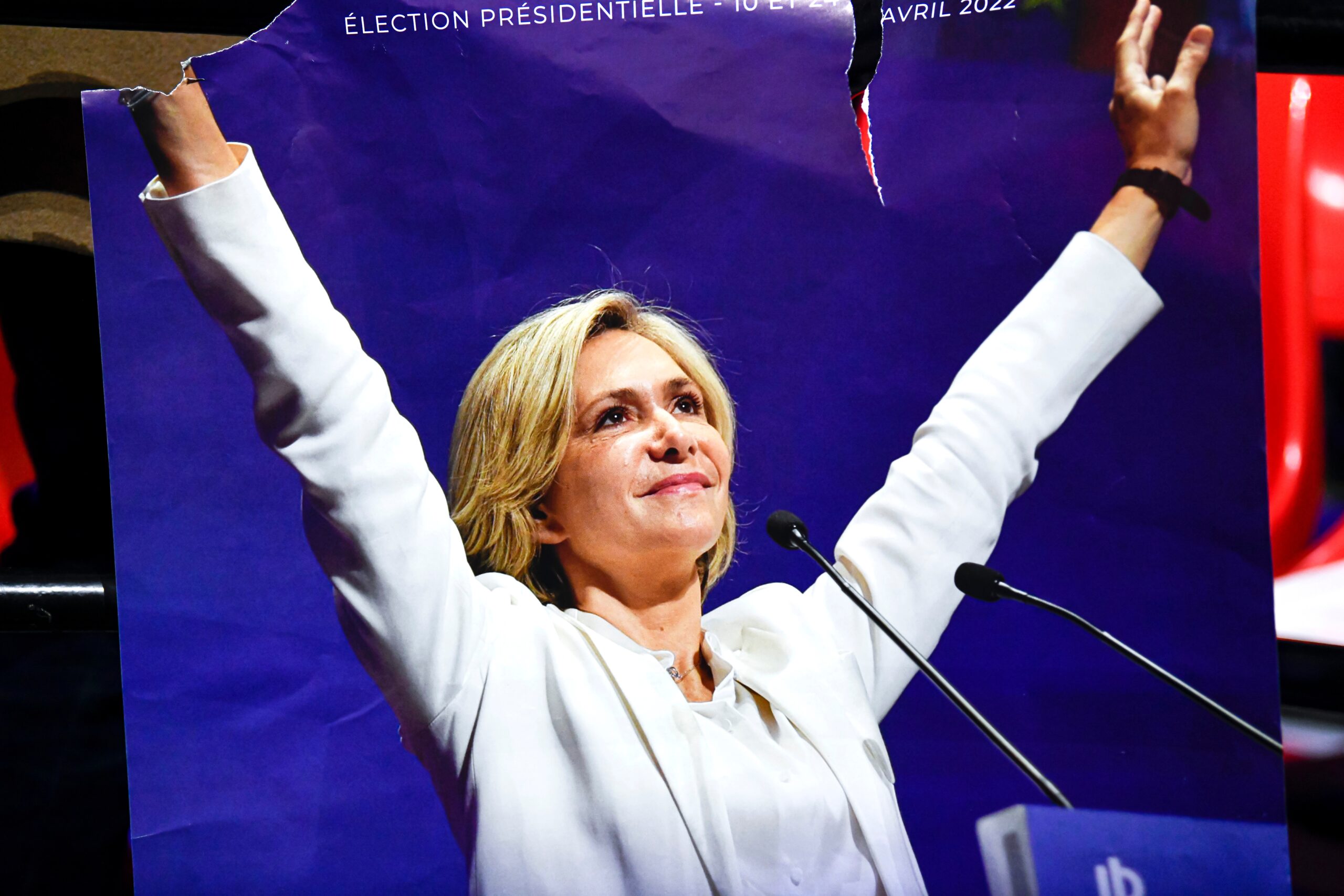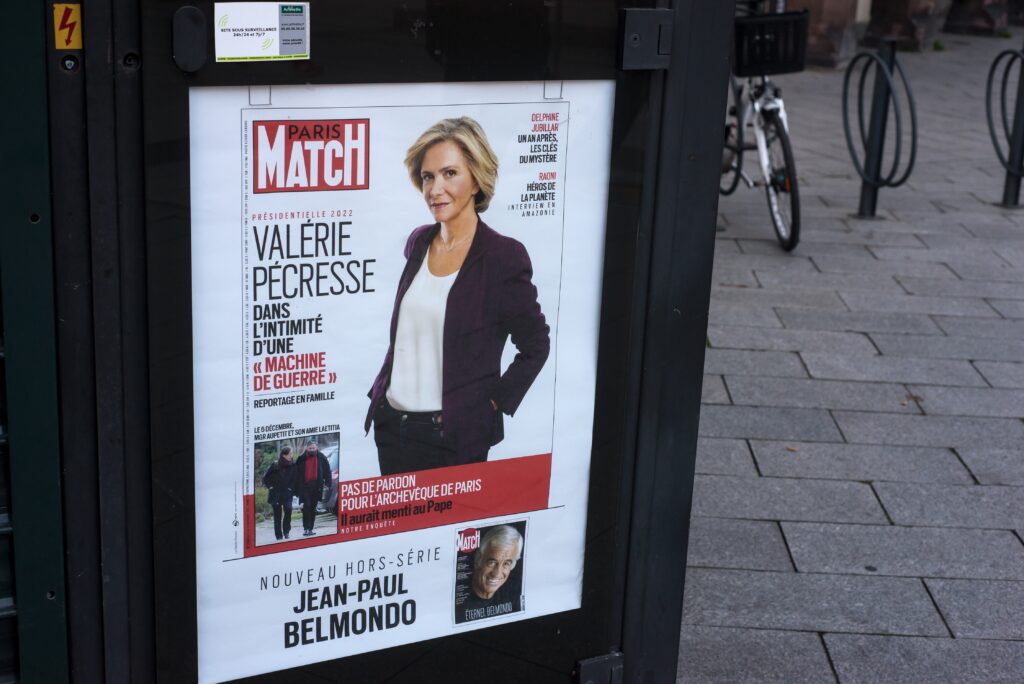Campaign Chronicles: Zenith

One of the most destructive aspects of the Electoral College in the United States is that it locks the country into a two-party system. If one of those parties is taken over by an unfit individual with authoritarian ambitions and doubtful loyalty to the country (let’s say), then the entire system is in peril.
France, in contrast, has three parties on the right. Éric Zemmour’s Reconquête! and Marine Le Pen’s Rassemblement national (RN), though they differ somewhat, represent the hard right: anti-immigrant, anti-Islam, pro-Putin, anti-NATO and anti-European Union. The third and oldest party is Les Républicains (formerly UMP), brought together out of several previous center and right parties by President Jacques Chirac in 2002.
They have fought hard, over the past few years, to differentiate themselves from the extreme right (even as the American Republican Party has embraced it). With the LR candidate, Valérie Pécresse, they even boast a party platform that has some centrist elements.

Pécresse, currently president of the Île de France region (since 2015), a former deputy, a Minister under President Nicolas Sarkozy, unveiled her platform to a full house at the Zénith amphitheater (seating capacity about 7,000) in La Villette on February 13, 2022.
It would not do to overemphasize the centrism of her speech, which hit a number of familiar themes on the right in both the United States and France: deregulation of industry; retirement reform; control of the border (“if people on the front line of the chantage migratoire–migratory blackmail–want to build a wall, I’ll support them”). Rebuild industry and jobs. Rebuild the schools, to end the “social immobility” of those on the bottom (she said nothing about banning books or CRT). Cut taxes. Strengthen the health care system; there are five million people who do not live close to any health care center (as opposed to ending the right to health care, as in the US Republican Party). Do something about the high price of gas, as she realized–a gesture to the gilets jaunes–that many people did not have the option of working from home but had to drive.
She would revive a popular Sarkozy policy–”travailler plus pour gagner plus,” or “work more to earn more,” and she would end the taxes on overtime; she would restore family allowances, or payments per child, which were reduced and became means-tested under President François Hollande.
She would reform nursing homes. Help the handicapped (or as the French more thoughtfully express it, “persons who are in a situation of having a handicap.”)
And there were some elements that are peculiarly of the French right wing. She would use a popular referendum (one of the gilets jaunes demands) to determine French preferences on immigration, security, and secularism; one hopes not, as the Brexit example shows the danger of deciding complicated issues through a plebiscite.
She would insist upon assimilation; France is open to immigration if those who arrive, become “French in their heart, not merely French with [citizenship] papers.” Mayors would be given the power to “break up”–casser–neighborhoods that had become unassimilated enclaves.
She would forbid burquas in France, the burkini at the beach and in public swimming pools, the veil anywhere. “For me,” she said, “the veil is not simply a piece of clothing, it is not a religious requirement, for me it is a sign of submission for women. Marianne (the symbol of France) is not a veiled woman.” And while she supported all families (implying same sex marriages), there was one thing she would not support–surrogacy, which made a woman’s body into a commodity.
And she turned her womanhood into an advantage; she reminded her audience of Angela Merkel and Margaret Thatcher; she had that force within herself: “I am the indomitable French woman (Je suis la femme française indomptable.)”
So it was a pretty good speech, with a great deal of substance and specifics–not that I agreed with much of it, but it was clear.
It was also widely panned. The press and social media treated it as a disaster, and wondered loudly if she could ever recover. (Men get many mistakes; women get one.) Part of the problem was style. She has a very slow delivery (like late 20th century products of the grandes écoles, in her case the ENA or, as one commentator mentioned, very much like the speech pattern of De Gaulle. As a non-native speaker, I rather enjoy this.) She has a pleasant speaking voice. However, there were too many pauses; she revealed a tendency to stop her speech entirely to allow the chanting throughout the hall to continue, as if unable to overcome the passion of the crowd; sometimes she paused when there was no audience response, though she expected one, until someone obligingly started to shout a slogan. At about 75 minutes, the speech was too long and too slow.
Le Parisien covered the aftermath with gossipy zeal. One LR leader, who wished to remain anonymous, claimed to have been getting text messages of alarm throughout the speech, and noted that it was apparently “even worse” on television than in the auditorium. She took too many drinks of water (the header image of the article showed her drinking bottled water). She had to apologize the next day, noting that “If you want orators, there are plenty of them in the campaign, I’m a do-er (faiseuse).
Her campaign spokespersons were in full damage control mode. Geoffroy Didier said that she had now learned “that she should no longer observe such long silences” in between her sentences. Aurelien Pradié was irate: “I’m tired of the discussions on style. That comes from these guys who can’t put three words together.” The “misogyny” behind these words was obvious. She was better in smaller formats, with more face to face interaction; and he added “vulgarly,” as Le Parisien noted (but also quoted), “The big meetings every Sunday where the candidates jerk off (se branlent) in public, is that truly useful for the French people?”
One criticism was more justified, and one suspects that she or her speechwriters had been too clever by half. Early on, she stated that there would be neither the “great impoverishment/loss of status (déclassement)” nor the “great replacement.” This struck many as a disturbing dog whistle to the far right. She explained that she meant that she wasn’t going to allow the theories of Zemmour and the extreme right to take over the debate. Others believed that she had acknowledged that the “great replacement” was a reality, and that she would stop it (and the extreme LRs actually were happy about that). Jean-François Copé, a party notable, said he wished she had been harder on the extremist parties.
Her poll numbers cratered, so that she was fifth (with 11.5% of the vote in the first round), just behind Jean-Luc Mélenchon. The “dying candidacy” narrative took over, coloring all reporting about her.
Russia invaded Ukraine on February 24, 2022.
The war at first seemed to suck all the air out of the room. “This guy [Macron] has all the luck,” said one of her closest advisors, referring not only to the phone calls with Zelensky and Putin, but also to the effect of rallying around the president. Prominent LR Éric Ciotti, speaking for Pécresse on March 4 at Chartres, said hopefully that this sense of national unity “was not going to last forever.”
Spokesperson Didier, in an indication of the new line that would be taken by her campaign, stated that the war was “a turning point” that would bring the focus to the “serious candidates”–of which there were only two, Macron and Pécresse. The other three of the top five–Le Pen, Zemmour, and Mélenchon–had lost credibility because of their links to Putin and their obvious reluctance to criticize him. She would be taking “risks” to fight for her candidacy, including a one-on-one debate with Zemmour.
The debate was scheduled for March 10.
And with the revelation that a dog, Douglas*, had been a registered voter in the primary that had selected Pécresse as the LR candidate, Zemmour’s spokespeople and supporters were licking their chops at the prospect.
=================================================================
*Not his real name. Subsequent research revealed that “Douglas,” actually named “Clovis,” is a Shiba Inu living in Nice.
======================================================================
Header image of Valérie Pécresse at Zenith from Shutterstock.com.
“Le discours de Valérie Pécresse au Zénith de Paris en intégralité. Published on February 13, 2022, by BFMTV.
Alexandre Sulzer, “‘C’était encore pire à la télé qu’en vrai’: après le meeting de Valérie Pécresse, la droite sur la défensive,” Le Parisien, February 14, 2022. https://www.leparisien.fr/elections/presidentielle/cetait-encore-pire-a-la-tele-quen-vrai-apres-le-meeting-de-valerie-pecresse-la-droite-sur-la-defensive-14-02-2022-AHHDRP5PLVHKVILGYY3DMCHF6Y.php
Jade Toussay, “Valérie Pécresse au Zénith: pourquoi tant de critiques sur la forme,” Huffpost, Feb 15, 2022. https://www.huffingtonpost.fr/entry/valerie-pecresse-au-zenith-pourquoi-tant-de-critiques-sur-la-forme_fr_620b9e14e4b0323024706028
Quentin Laurent and Alexandre Sulzer, “‘Depuis Zénith, ça ne va pas mieux’: Valérie Pécresse, une campagne dans la tourmente,” Le Parisien, March 5, 2022.https://www.leparisien.fr/elections/presidentielle/depuis-le-zenith-ca-ne-va-pas-mieux-valerie-pecresse-une-campagne-dans-la-tourmente-05-03-2022-FRZZJVYS5FA2TIX3R7OVB56T2E.php
Angela Chrisafis, “French rightwing candidate mocked after dog joins her party,” The Guardian, February 24, 2022. https://www.theguardian.com/world/2022/feb/24/french-rightwing-presidential-candidate-valerie-pecresse-mocked-after-douglas-the-dog-joins-party